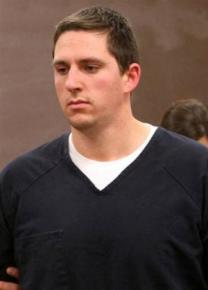Oscar Grant’s killer goes free
reports from Oakland on the eruption of outrage after Johannes Mehserle, the cop who shot and killed Oscar Grant III, was released from jail.
LESS THAN a year after being convicted of killing Oscar Grant III, former Bay Area Rapid Transit (BART) police officer Johannes Mehserle was released from a Los Angeles jail on June 13.
In the early morning hours of January 1, 2009, Mehserle shot Grant in the back as Grant lay face down on a BART station platform with his hands behind his back. The shooting was recorded by multiple witnesses on cell phone video, and the footage was seen around the country and the world.
In July 2011, a jury convicted Mehserle of involuntary manslaughter--the minimum charge. Despite being sentenced to two years in prison, Mehserle served a total of just 365 days behind bars since the beginning of his trial in June 2010.
During sentencing, the jury decided to impose a "weapon enhancement" charge, which could have led to a sentence of up to 10 years. However, Judge Robert J. Perry overturned the jury's decision. The same Judge Perry also signed Mehserle's release for June 13, 2011.
"This is painful," said Grant's uncle Cephus Johnson. "There was no justice in that courtroom. No accountability has been granted now that Johannes Mehserle is going to walk as though nothing has ever happened."

"I'm upset and angry," said Jack Bryson, the father of Grant's friends who witnessed the murder. "It's scary because the whole incident shows that this can happen to any of us. This can happen to your family."
Mehserle's early release prompted protests in Oakland, with over 250 gathering at the Fruitvale BART station, nicknamed "Grant Station" in remembrance of where Oscar was murdered. The multiracial crowd then marched three miles to downtown Oakland demanding justice.
Chants of "No justice, no peace, disarm all police," "Same thing every time. Being Black is not a crime," and "From Oakland to Greece, stop murder from police" filled the air. A heavy police presence shadowed the march throughout the entire route. At one point, police snatched a youth for alleged vandalism and threw him into a patrol car. When protestors tried to surround the vehicle, the car took off in reverse, nearly injuring several demonstrators.
Several demonstrators who witnessed the scuffle speculated that the arrest might have been a provocation. The alleged vandal was released 10 minutes later without being charged or cited. Before the crowd collected themselves to begin to march, unmarked vans with armed police were in the process of deploying officers. As the march resumed, no other incidents broke out.
The demonstration ended in the middle of downtown Oakland with a public speak-out that lasted a few hours. One Oakland resident pointed out the hypocrisy of the justice system saying, "Michael Vick was sentenced for four years for killing a dog. But a police officer murders a human being, and he serves less than a year."
Boots Riley, of the revolutionary hip-hop group The Coup, took to the mic and urged the crowd to "get organized and join organizations. We need to battle poverty and the racist police."
THE CASE of Oscar Grant illustrates how far the criminal justice system is willing to go to protect itself. At every step of the process, the police and the judicial system went to extreme lengths to maintain their legitimacy.
In the days following the murder, the BART police initially refused to release or arrest the officers involved. But a public outcry in the wake of footage being released on the Internet prompted several protests in the East Bay area.
Following turbulent demonstrations in Oakland on January 7-8, where over a hundred people were arrested, the district attorney's office moved on the case and finally charged Mehserle with murder the following week. Without the protests, Mehserle's subsequent conviction and sentencing likely would never have occurred.
However, many of the demands of the movement have not been attained. Not one member of the BART board has been reprimanded or censured for the attempted cover-up of the murder. BART police still patrol the subway system with Tasers and firearms with live ammunition. The other officers involved in the murder are still on the force. Tony Pirone, an officer who was videotaped calling Grant a "bitch-ass nigger" prior to the shooting, is still on active duty today.
Police in the East Bay area are still shooting down unarmed people in the street. One case is that of Derrick Jones--a barber in East Oakland who was shot in the back last November while fleeing from the police. Police said they "thought" Jones was reaching for a weapon. On inspection, they found a small scale in his hands.
At a time when tensions between the community and police are high, it is likely that there will be more police killings in the future. Despite the hope that some saw in the new administration of Oakland Mayor Jean Quan, the city is under pressure to carry out austerity measures and attract business development. Police are the tool being used to force through these measures.
However, dozens of speakers at the protests highlighted the need to keep the struggle going. Despite the lack of solid mass organizations to counter the racism and violence of the police in the East Bay area, hundreds, if not thousands, have been mobilized around the case of Oscar Grant.
Though Grant's murderers have not been brought to full justice, the movement forced the state to try to convict the man who pulled the trigger. Mehserle was the first police officer in California to be tried for murder for a shooting committed while on duty, and the jury's vote to convict him is a break from a long history of cops walking free, no matter how brutal their crimes.
"In the end," said Jack Bryson, "this shows that fighting back can make a difference."


